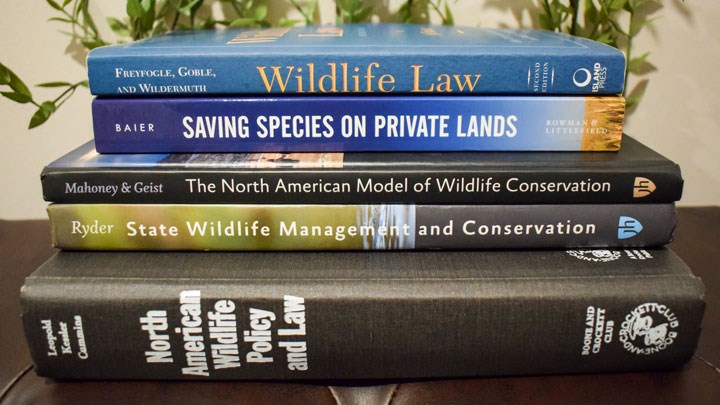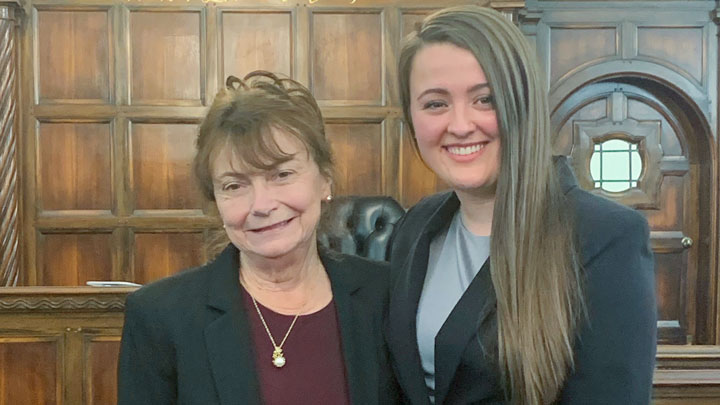
by Shelby DeVuyst, Executive Director, Center for Conservation Excellence - Thursday, January 20, 2022

Since the late 1800s, wildlife conservation has sustained an interconnected relationship with legislative decisions, public policy and public opinion. If a favorable combination of scientific fact and public opinion are met, new legislation may surface that opens opportunities to advance wildlife conservation efforts. The alternative is also true and represents a challenge facing the efforts of America’s conservationists today. For example, consider the impacts that conservation has endured when ballot initiatives involving the take of wildlife (such as doves) are put in front of the public to decide without the benefit of science behind the question. A changing society, specifically in empathy for animals and increased vegetarian/vegan diets, is resulting in decreasing consideration for scientific management of wildlife and legal, regulated hunting, albeit under legal mechanisms such as set seasons, bag limits and license requirements.
To both optimize and protect conservation efforts, the Center for Conservation Excellence (CCE) was born. Housed at the National Wild Turkey Federation’s headquarters in Edgefield, S.C., and with support from the National Rifle Association’s Hunters’ Leadership Forum (HLF) and the Association for Fish and Wildlife Agencies, the CCE’s mission is to educate students at the collegiate and graduate levels, as well as practicing professionals in the wildlife conservation field regarding the North American Model of Wildlife Conservation (NAMWC), threats to modern conservation efforts, the animal rights extremism movement and much more. This is incredibly important as decisions based on the court of public opinion in lieu of sound science and appropriate wildlife management tools are influencing how the public views its wildlife and ultimately votes on ballot initiatives.
The CCE’s foundational steps include three main components: undergraduate- and graduate-level education, post-graduate and supplemental education, and professional opportunities.

Step 1: Undergraduate- and Graduate-Level Education
The first step in providing wildlife conservation education is to incorporate existing college and law school curriculums with the CCE’s courses: Wildlife Law and Legal Issues with Energy Development and Wildlife. The Center has perfected these syllabi after several years of these courses being taught at Michigan State University College of Law in East Lansing, Mich. In light of COVID-19 and the movement to online or hybrid teaching, the syllabi and assignments have been modified to fit these changes.
To maximize the CCE’s ability to reach the largest number of students, the steady addition of wildlife law and/or wildlife policy courses in new colleges is imperative. The concept of education in wildlife law/policy is not limited to law or pre-law curriculums; there are existing curriculums that allow for crossover between law colleges and, for example, master’s programs related to natural resources and conservation policy.
Step 2: Post-Graduate and Supplemental Education
The CCE will continue to educate and reach those who are new to the wildlife conservation industry through providing additional educational opportunities. Efforts will include the production of educational videos on introductory topics of wildlife law and offering continuing legal education seminars on conservation law.
The short educational videos on introductory topics of wildlife law are coming soon and will be shared across the CCE’s website, social media platforms and more. Additionally, these videos will be shared directly with field staff, student organizations, conservation clubs, state bar associations and all who are interested. Videos will cover topics such as the NAMWC, the Public Trust Doctrine, state and federal jurisdiction of wildlife, animal welfare versus animal rights, and the importance of the constitutional right to hunt and fish amendments in state constitutions.
Second is the Continuing Legal Education Seminar on Conservation Law. The Center will offer an online, pre-recorded seminar to educate current and future practicing attorneys and judges on the realities of wildlife law and the applicable statutes that regulate it—as opposed to the court of public opinion. Topics covered in this seminar will include: jurisdiction, wildlife authority, public trust, constitutional right to hunt, animal welfare, international law, and ethics. The Center’s pilot program held in cooperation with the South Carolina Bar Association was very successful. A national roll out of conservation law seminars is expected to be equally successful.
Step 3: Professional Opportunities
The final foundational piece of the center’s mission is a practical one aimed at helping students and professionals find conservation-based internships and careers. Students looking to begin their careers in conservation law and policy, as well as the schools that try to appeal to these individuals, are interested in both internships and externships that increase students’ chances of success following graduation. The conservation industry partners that contribute to the program are interested in helping to create well-trained professionals who will eventually give back with their expertise and passion by embracing their new education and experiences. To date, 40-plus law students have been placed with state agencies and nongovernmental organizations and now have the opportunity to practice concepts taught in wildlife law classes.
Recently, one law student had this to say about her placement:
“I didn’t realize the scope of conservation and, more specifically, conservation law, until I reached out to Professor Frampton. Now that I have had the opportunity to learn from the [Center for Conservation Excellence] and complete a summer internship, I am excited to explore conservation law with my new foundation of knowledge!”
– Darcy Delligatti, Summer 2021 Intern from West Virginia University College of Law

The CCE is fortunate to not have to stand alone in its mission as it fights for America’s hunting heritage and works to educate the next generation of wildlife conservation professionals as to the principles of the NAMWC. It is grateful to have staunch support from the NRA HLF, which actively works to address the cultural, political demographic and technological challenges to the future of hunting and wildlife conservation in the 21st century.
“It’s great to see the creation of the Center and that so many other organizations are partnering up and working together,” said Michael Jean, director of the Office of Litigation Counsel for the NRA Institute for Legislative Action. “I’ve been practicing in conservation law for a decade now and have not seen many resources for people looking to get into field. The Center fills that void, and I look forward to working with it.”
If you are interested in helping the Center for Conservation Excellence to place the Wildlife Law curriculum in additional law colleges, partnering on a Conservation Law Seminar or placing a student in a conservation internship, or if you are in need of future conservation law graduates at your organization, please contact Shelby DeVuyst at [email protected]; 989-545-9729.
E-mail your comments/questions about this site to:
[email protected]
Proudly supported by The NRA Foundation and Friends of NRA fundraising.
